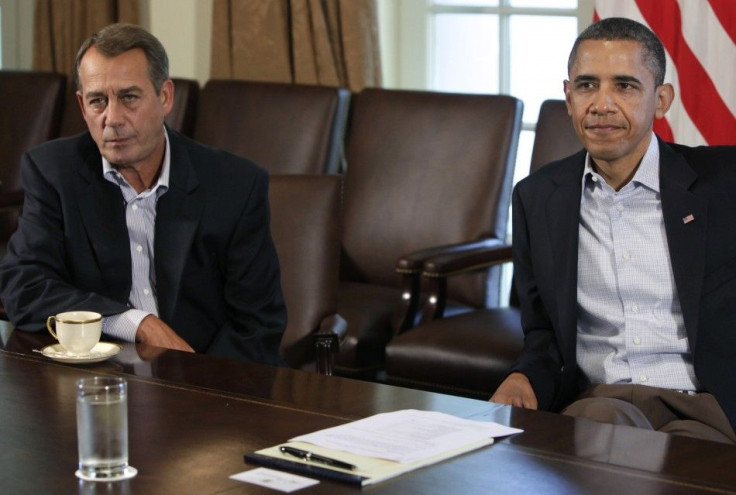Obama's Options If No Deal on Debt Ceiling Hike

If the impasse over the U.S. debt limit isn't broken soon, President Barack Obama will be forced to decide how he will manage the crisis.
The U.S. is drifting closer to a credit rating downgrade and default as Obama's Democrats and their Republican rivals work on competing plans to cut spending and raise the debt ceiling.
Treasury Secretary Timothy Geithner and a small team of his aides have worked on contingency plans should Congress fail to raise the U.S. borrowing limit by an Aug. 2 deadline.
Officials said on Wednesday the Treasury will lay out a plan in the next few days about how the government will operate if it appears Congress may miss the deadline.
The administration has said little in public about its plans and there is disagreement among private-sector experts on the feasibility of some of the options. A number of them are complicated and could provoke a political backlash.
Even if the administration were to implement some of the options, the debt crisis could still trigger turmoil in financial markets, sending the dollar lower, U.S. interest rates higher and putting the economy at risk.
Here is a look at the steps Obama could consider:
SALE OF ASSETS
Treasury could consider selling off some of the government's assets, including holdings of gold and mortgage-backed securities.
U.S. officials say this option has major drawbacks because it would show the world the U.S. is having difficulty honoring its obligations. These officials say the government might also have to accept fire-sale prices for the assets and that the sales likely would not buy much time.
14TH AMENDMENT
Some legal scholars see a possible trump card for Obama in a provision of the Constitution that says the U.S.' public debt "shall not be questioned."
Those scholars contend the 14th Amendment clause would give Obama the right to bypass Congress and raise the debt limit on his own.
Other legal experts believe Obama does not have the authority to ignore the cap on borrowing set by Congress. Obama administration officials have said they do not see the 14th Amendment clause as a solution to the impasse.
"I have talked to my lawyers," Obama said on Friday when asked about the option at a town hall forum. "They are not persuaded that that is a winning argument."
Treasury Secretary Timothy Geithner said on Sunday that bypassing Congress was "not a workable option" to avoid a default crisis.
On Tuesday, Obama's spokesman, Jay Carney, issued the strongest denial so far that it could be used. "The Constitution makes clear that Congress has the authority, not the president, to borrow money and only Congress can increase the statutory debt ceiling," he said.
PRIORITIZING PAYMENTS
If the Treasury decides that neither an asset sale nor the use of the 14th Amendment are workable, it could look at delaying some payments to recipients of government benefits, government employees, outside contractors or other parties to ensure it has enough cash on hand to keep paying interest on its debts.
The Treasury will collect $172 billion in revenue in August. Without fresh borrowing, that would cover only 45 percent of the $306 billion in payments the government is scheduled to make next month, according to the Bipartisan Policy Center think tank.
Some conservative Republicans have suggested Treasury could manage a default by shutting down many government services and putting a priority on debt payments. Geithner has dismissed this as unworkable.
If talks with congressional leaders on the debt ceiling fail, one big decision Obama would face would be what to do about a $49 billion Social Security payment scheduled to go out on Aug. 3.
Obama has warned that Social Security payments could be at risk without an increase in the debt limit.
Changing the dates of the 80 million payments the government makes every month would also be complicated because the payments are automated so computers would need to be reprogrammed.
ENLISTING HELP OF THE FED
In a sign that financial authorities were coordinating closely on the unfolding debt drama, Geithner met on Friday with Federal Reserve Chairman Ben Bernanke and New York Federal Reserve Bank President William Dudley.
Philadelphia Fed President Charles Plosser told Reuters the U.S. central bank, which acts as the Treasury's broker in financial markets, could not step in and borrow money on the Treasury's behalf. He said that would amount to conducting fiscal policy, which is not part of the Fed's mandate.
But the Fed might need to become involved in some operational issues since it clears checks for the government for everyone from Social Security recipients to federal workers.
Plosser said issues that would need to be looked at include: "How the Fed is going to go about clearing government checks? Which ones are going to be good? Which ones are not going to be good?"
Because the New York Fed is regularly in close contact with financial market participants, the central bank would also play a crucial role in monitoring the market reaction if a default or U.S. credit downgrade were to spark a panic among investors. The central bank played a similar role during the 2008 financial meltdown following the collapse of Lehman Brothers.
© Copyright Thomson Reuters {{Year}}. All rights reserved.





















